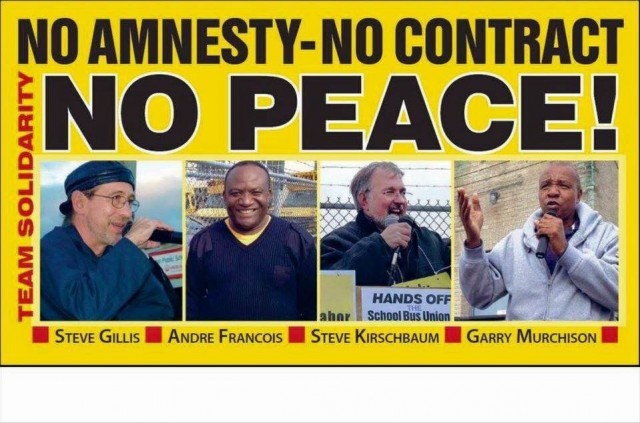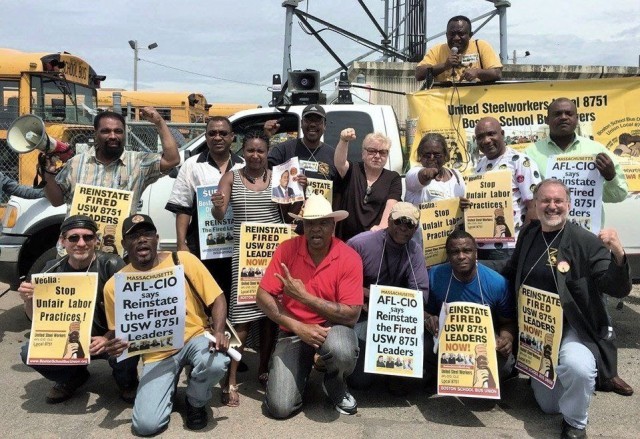Lessons of the Boston School Bus Drivers’ victory
PART 1
After more than two years of hard-fought struggle, last year the militant, fighting rank and file of the Boston School Bus Drivers Union — United Steelworkers Local 8751 — won a historic victory against global giant Veolia/Transdev, one of the most notorious capitalist union busters, as well as Boston Public School bosses, Boston Mayor Marty Walsh and their media mouthpieces.
Four fired union leaders, out of work since October 2013 on bogus charges of leading a wildcat strike, went back to work on Dec. 23, 2015. Transdev bosses were bound and determined that the four would never return. But at 4 p.m. on Dec. 18, after a marathon 25-hour negotiating session, Veolia and city bosses signed comprehensive settlement agreements with the union that reinstated President Andre François, Vice President Steve Kirschbaum, Financial Secretary Steve Gillis and Grievance Chair Garry Murchison.
 In addition to reinstatement of the four with full seniority rights and a substantial monetary payment, the local won a contract with economic justice and the protection of 40 years of the
In addition to reinstatement of the four with full seniority rights and a substantial monetary payment, the local won a contract with economic justice and the protection of 40 years of the
collective bargaining process.
What are the lessons that can be learned from this victory? How can they be put to use to help the working class push back against the decades-long anti-labor offensive? How can we reverse the tide of concessions, setbacks and the decline in union density that Ronald Reagan’s breaking of the Professional Air Traffic Controllers Organization instigated? We can learn a lot from this small union — smaller than PATCO — that used the weapon of solidarity to push back the evil capitalist monster that the workers call “Transdevil.”
Below are excerpts from the first part of a conference call dialog between Team Solidarity and Workers World Party, held Feb. 14, 2016, on “harvesting the lessons of the Boston victory.” More of the dialog will be published in future issues, and the full discussion will be online at workers.org.
‘A gravity-defying victory’:
Larry Holmes
First Secretary, Workers World Party
The big question before us is how on earth was the Boston School Bus Drivers Union able to compel this incredible, gravity-defying victory in the present global environment — where capitalism is so strong and so concentrated that the odds of workers winning in any given struggle are, at best, challenging, especially a relatively small local of about 900 members, United Steelworkers Local 8751.
Workers World Party’s role was important. And the reality of the union’s long history in the struggle against racism — its ties to leaders and organizations in the Black community in Boston — was indeed an important factor. And there was solidarity from those outside the union, whether from other unions or other progressive people.
Solidarity is a complex issue. Certainly there was a lot of solidarity on paper and financial contributions, necessary when you have four people who are not getting salaries for two years. But there is a difference between a union passing a resolution supporting another union and a union sending 10 or 20 workers to join a picket line.
There are different levels of solidarity. In this capitalist crisis, more material forms of solidarity, as opposed to symbolic forms of solidarity, will become more and more necessary.
But any trade unionist, any militant worker, looking at what happened in Boston, might ask themselves: How did this union, this local, often at odds with its international, often at odds with the union hierarchy, how did it take on a monstrous, multibillion-dollar transnational corporation that prides itself on its expertise in decapitating and busting unions — take it on and prevail?
How is it that this company could not separate a handful of leaders from the rest of the union? One would think that, in these days, the rank and file might hang on and support the leaders for a little while, a few months, a half-year, maybe a year — but two years! Day in, day out, months, coming through on everything!
What was most decisive — though not the only factor — is the fact that the Boston School Bus Drivers Union is not a union where a few people represent the workers. It is a rank-and-file union; it is a union where the workers run the union. They are empowered by it, and this is unusual in many places, but very unusual in this country. Many trade unionists will tell you that, in most instances, union leadership and union staff become separated from the rank and file, even well-meaning, progressive union leaders and staff. Months and years and decades go by, and they have very little contact and very little political and social interaction with the rank and file. If workers come to a couple of meetings a year, that’s significant. Sometimes workers forget they are even in a union, and that reflects their relative alienation from the leadership.
But the Boston School Bus Drivers Union is the opposite of that. It’s a different kind of union, and that takes work — not only one meeting a week in a yard, but meetings every day, especially if the union’s under attack. This is important in how to analyze what was decisive in this victory. Other unions are not like that. When the company comes down, the union and the workers are not prepared, and then the company prevails, usually quite easily, no matter how much symbolic solidarity the union gets.
But in a union like this one, hard work, concentrated day-in, day-out work, makes it a union of the workers, not just for the workers with a few people far away who exert power. That is a big lesson from this victory. I hope we can share this revolutionary way of organizing that’s the antithesis of “business unionism.”
‘If you stick together
and you don’t waver’:
Andre François
President, USW Local 8751,
and one of the Four
There’s no other solidarity than this since I’ve been born, since I’ve been working, You’ve been there with your money, you’ve been there in person, you’ve been there with your ideas. And I couldn’t thank you enough for your solidarity. All I can say is that I guarantee it’s going to stay with me until the day I die. I’ll take that to my grave. I’ll tell my children about it, I’ll tell my grandchildren about it. I went from being a fired worker, a fired recording secretary and unemployed, to being an employed union president because you gave solidarity and help.
It’s a victory that we will take back to the school — that we were able to pull it off without a strike. That says a lot in this day and age. You don’t have a strike, and you have a struggle like that. Right now, Boston Public School administration has actually let the company know, “Once you failed to get rid of these drivers, now you have to work with them.” That’s a real testament on how strong and tough you can be if you stick together, and you don’t waver for this long.
‘Building a movement’:
Chuck Turner
Former Boston City Councilor
and community activist
Firstly, if Team Solidarity—and the Four who were fired—had not stayed together, had not continued to do the work that was necessary to keep the membership together, if they had not been willing to make the tremendous sacrifices that they made, it would have been impossible for the victory to have happened. So the willingness of people to sacrifice and endure and persist is to me a driving force in the victory.
Secondly, USW 8751 is a different type of union. The leadership are workers, and the workers are leaders. While the Four who were fired are seen as Team Solidarity, the reality is that the union is Team Solidarity. That solidarity, combined with the sacrifices, courage and persistence of the Four, created the momentum that enabled the victory to take place.
The third factor is that not only had this union throughout its history focused on the needs and concerns of its members, it has recognized its members are part of a larger community under siege. The union has been in solidarity, not only with its own members, but in solidarity with the community. There are innumerable struggles that we could talk about — from coming together with the community to save a key post office, to the coming together with workers in other unions, to the struggle around education. Because the bus drivers got very involved in organizing around education — not just the question of jobs, but the question of the quality of education, the actions of the school administration that were not in the best interests of our children. The bus drivers did the work over the decades of creating the bond of support with the community. That meant when there was this crisis, there was a level of support in the community, despite all the attempts by the city and Veolia to break down that relationship.
There’s a word that gets misused and not understood but there was a love — and there continues to be an outpouring of love — that is a recognition of our need to be together, to appreciate each other, to stick together with each other, that the union leadership has shown throughout its history. It’s that spirit of love that the solidarity has been built around and that has enabled a tremendous victory, not only for the rights of workers — and particularly Black workers — but for the example that through solidarity and loving relationships we can overcome even the greatest of odds.
To be continued.


